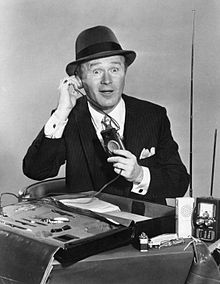Loading AI tools
1966 American TV series or program From Wikipedia, the free encyclopedia
The Double Life of Henry Phyfe is a 17-episode American sitcom broadcast on ABC from January 13 to September 1, 1966,[1][2] and starring Red Buttons.[citation needed]
This article needs additional citations for verification. (July 2019) |
| The Double Life of Henry Phyfe | |
|---|---|
 | |
| Genre | Sitcom |
| Created by | Luther Davis |
| Starring | Red Buttons Fred Clark Parley Baer Zeme North |
| Theme music composer | Vic Mizzy |
| Country of origin | United States |
| Original language | English |
| No. of seasons | 1 |
| No. of episodes | 17 |
| Production | |
| Running time | 30 minutes |
| Production companies | Luther Davis Productions Filmways Television |
| Original release | |
| Network | ABC |
| Release | January 13 – May 5, 1966 |
Henry Phyfe (Buttons) was a mild-mannered accountant, until circumstances forced the American Counter Intelligence Service (CIS) to recruit him to impersonate a foreign agent named U-31, who had been killed in an automobile accident. The agent looked just like Phyfe, but the two men's personalities were drastically different. That severe contrast laid the groundwork for many of the episodes.
Phyfe's girlfriend, Judy Kimball, her mother Florence and his boss at the accounting firm, Mr. Hamble, were all unaware of Henry's secret life, with Gerald Hannahan, the regional director of the agency the lone person to know the secret. The characters of the girlfriend and mother-in-law were phased out halfway through the abbreviated run.
A recurring plot line was that U-31 had a wide range of skills (golf, samurai sword fighting, etc) which Phyfe would attempt to learn (generally unsuccessfully) just before his mission.
| No. | Title | Directed by | Written by | Original air date |
|---|---|---|---|---|
| 1 | "Phyfe and a Filly" | Unknown | Unknown | January 13, 1966 |
| 2 | "Phyfe on a Ferry" | Unknown | Unknown | January 20, 1966 |
| 3 | "Whatever Happened to Yesterday?" | Leslie H. Martinson | Ben Starr | January 27, 1966 |
| 4 | "Phyfe and the Models" | Unknown | Unknown | February 3, 1966 |
| 5 | "The Reluctant Lover" | Howard Morris | Leo Rifkin | February 10, 1966 |
| 6 | "Phyfe's First Felony" | Charles R. Rondeau | Rich Eustis & Al Rogers | February 17, 1966 |
| 7 | "The Unfriendly Persuasion" | Leslie H. Martinson | Story by : Charles Marion & Monroe Manning Teleplay by : Phil Leslie and William Raynor & Myles Wilder | February 24, 1966 |
| 8 | "Phyfe and the Code Book" | Unknown | Unknown | March 3, 1966 |
| 9 | "The Old Flame" | Unknown | Unknown | March 10, 1966 |
| 10 | "Operation Henry Phyfe" | Unknown | Unknown | March 17, 1966 |
| 11 | "Visit to Washington" | Unknown | Unknown | March 24, 1966 |
| 12 | "Phyfe Takes a Wife" | Unknown | Unknown | March 31, 1966 |
| 13 | "Jail Bird Phyfe" | Howard Morris | Sloan Nibley & Bill Lutz | April 7, 1966 |
| 14 | "Spend a Million Phyfe" | Unknown | Unknown | April 14, 1966 |
| 15 | "A Shot in the Dark" | Unknown | Unknown | April 21, 1966 |
| 16 | "Phyfe Goes Skiing" | Unknown | Unknown | April 28, 1966 |
| 17 | "Will the Real U-31 Try to Stand Up?" | Unknown | Unknown | May 5, 1966 |
Actor Peter Bonerz (The Bob Newhart Show) had auditioned for the role of Henry Phyfe before Red Buttons was selected.[3]
Buttons noted that, unlike Agent Maxwell Smart in NBC's new hit Get Smart, his character was shy, used no gadgets in his work, and was an impostor, not an actual agent. Phyfe's CIS boss was played by veteran character actor Fred Clark, who bore a superficial physical resemblance to Smart's "Chief" played by Edward Platt.
The show marked Buttons' return to weekly television after his variety show had ended a three-year run in 1955. During the interim, Buttons found roles in 15 different motion pictures, including an Academy Award-winning performance in the 1957 Marlon Brando film, Sayonara.
The concept of an "every man" recruited to impersonate someone of importance has been used for many years in literature (for example, The Prisoner of Zenda). A few months after the series' cancellation, the animated film, The Man Called Flintstone, featured the same premise as Henry Phyfe, while another TV series, The Man Who Never Was, debuted in the fall of 1966 with the premise reversed as a spy found himself impersonating a businessman who had been killed.
Seamless Wikipedia browsing. On steroids.
Every time you click a link to Wikipedia, Wiktionary or Wikiquote in your browser's search results, it will show the modern Wikiwand interface.
Wikiwand extension is a five stars, simple, with minimum permission required to keep your browsing private, safe and transparent.